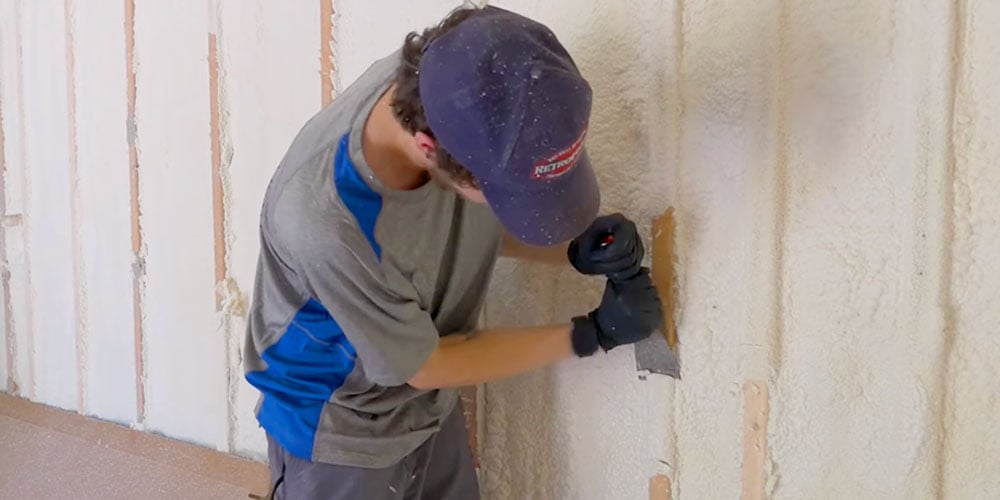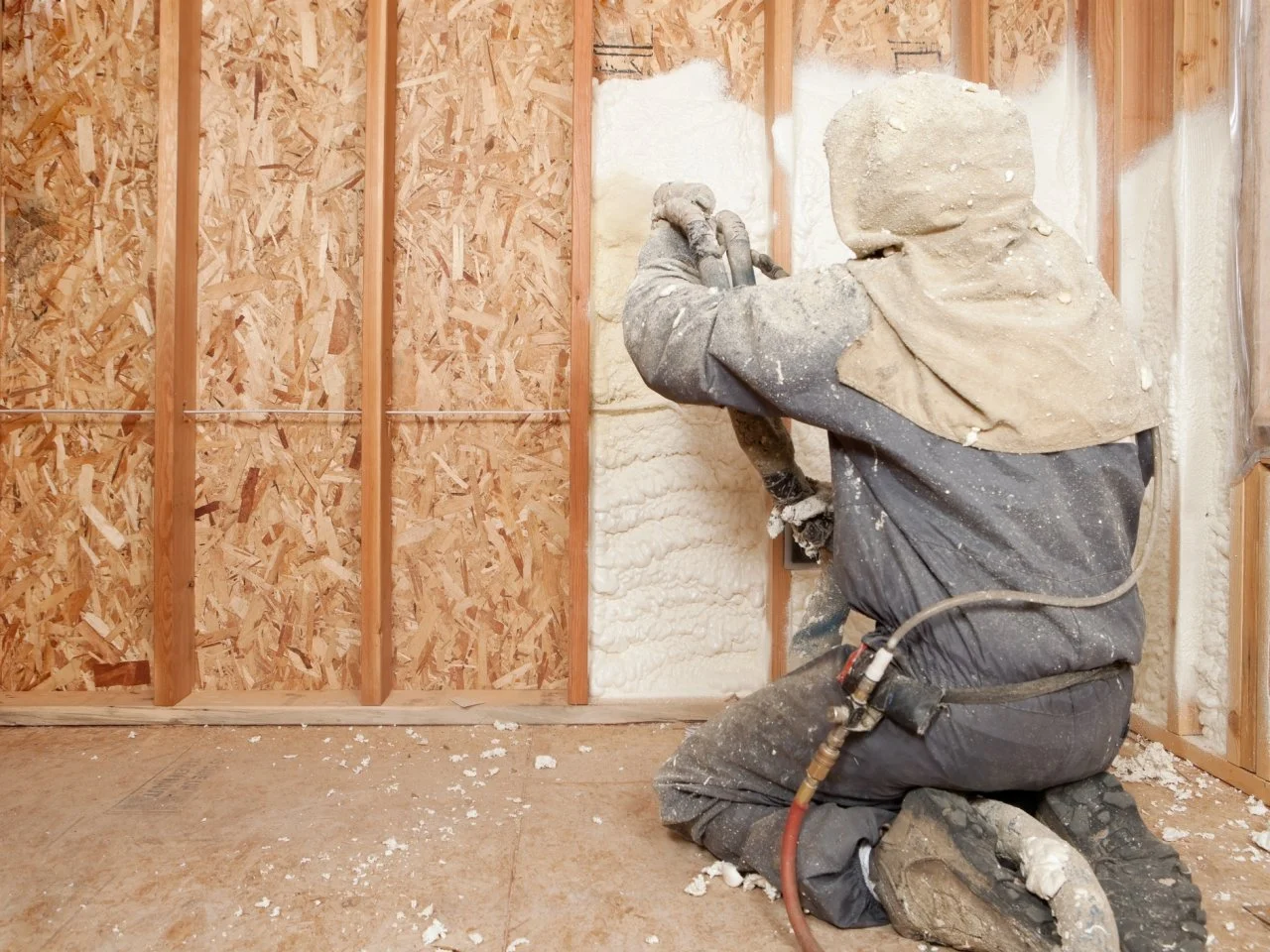Tips for Preserving Your Spray Foam Insulation for Long-Term Performance
Tips for Preserving Your Spray Foam Insulation for Long-Term Performance
Blog Article
Spray Foam: The Ultimate Option for Air Sealing and Insulation
Spray foam insulation has arised as a leading solution for reliable air sealing and thermal insulation, offering a special mix of residential or commercial properties that establish it apart from conventional techniques. Comprehending the full range of its advantages, setup processes, and comparisons with other insulation kinds is crucial for making informed decisions.
What Is Spray Foam?
Spray foam is a flexible insulation material that combines the principles of air securing and thermal resistance to improve power performance in structures. Made up mainly of polyurethane or various other similar substances, spray foam is applied as a fluid that expands upon call with surface areas, creating a strong, continuous layer of insulation. This special residential property permits it to fill up gaps, splits, and gaps that traditional insulation materials might forget, offering a remarkable air seal.
There are two major sorts of spray foam: open-cell and closed-cell. Open-cell spray foam is lighter and more adaptable, supplying superb noise absorption and a lower R-value per inch - Spray Foam. In comparison, closed-cell spray foam is denser, giving a higher R-value, wetness resistance, and added structural stability to constructing elements
The application procedure usually entails customized tools, making sure a smooth application that sticks to numerous substrates, including concrete, steel, and timber. This flexibility makes spray foam appropriate for both new buildings and retrofitting existing structures. Its ability to create an airtight obstacle dramatically adds to lowering power intake and improving indoor air top quality, therefore making it a preferred choice amongst homeowners and building contractors alike.
Advantages of Spray Foam Insulation
One of the most significant advantages of spray foam insulation is its exceptional capability to develop a continual air barrier, which efficiently lessens energy loss. Unlike traditional insulation materials, spray foam increases to fill fractures and voids, making sure that air leakage is dramatically minimized. This characteristic not just boosts energy efficiency but likewise results in lower utility expenses with time.
In addition, spray foam insulation offers superior thermal resistance, adding to an extra stable indoor environment. Its high R-value per inch permits reliable insulation in restricted spaces, making it optimal for attic rooms, walls, and crawl spaces. Furthermore, the moisture-resistant residential or commercial properties of spray foam assistance prevent mold and mildew development, advertising healthier living conditions.
One more vital benefit of spray foam insulation is its sound-dampening qualities (Spray Foam). It effectively reduces sound transmission between rooms, creating a quieter and extra comfy home atmosphere. The resilience of spray foam likewise stands out, as it does not droop or settle in time, maintaining its efficiency throughout its lifespan
Exactly How Spray Foam Functions
Recognizing how spray foam insulation works is essential for valuing its efficiency in air securing and thermal resistance. Spray foam insulation is composed of two primary components: isocyanate and polyol material. When these parts are combined, they go through a chain reaction that creates the product to increase quickly, creating a thick foam that fills up spaces, cavities, and cracks.
As the foam increases, it adheres to surfaces, developing an impermeable seal that dramatically lowers air infiltration. This characteristic makes spray foam insulation very effective at protecting against drafts and wetness infiltration, which can result in energy loss and damage in time. Furthermore, the closed-cell variation of spray foam uses premium thermal resistance as a result of its inflexible framework, successfully decreasing warmth transfer.
The one-of-a-kind homes of spray foam permit it to satisfy irregular surfaces, guaranteeing detailed coverage and a smooth barrier. Because of this, spray foam insulation not just boosts power effectiveness however likewise contributes to boosted interior air high quality by minimizing the build-up of toxins and allergens. Inevitably, understanding the technicians behind spray foam emphasizes its role as an exceptional selection for insulation and air securing in both commercial and property applications.
Installment Refine Summary

Prior to installation, the area has to be sufficiently cleansed and prepped, guaranteeing that surface areas are without moisture, debris, and dust. Due to the fact that contaminants can endanger attachment and overall performance, this step is essential. When the area is prepared, the application includes blending the 2 elements of the spray foam, which increases upon call and loads voids properly.
Educated specialists need to perform the installment, making use of customized tools to make certain consistent insurance coverage and optimum thickness. Safety and security preventative measures, consisting of using protective gear and ensuring proper air flow, are essential during this process. After application, the foam commonly remedies swiftly, developing a solid barrier that boosts power effectiveness.
Comparing Spray Foam to Conventional Insulation
When evaluating insulation options, spray foam insulation stands out in contrast to standard products such as fiberglass and cellulose. Unlike fiberglass and cellulose, which can allow air infiltration, spray foam expands upon application, filling crevices and spaces to create an impermeable seal.
In addition, spray foam offers a greater R-value per inch than traditional insulation kinds, using more effective thermal resistance in a thinner profile. This characteristic is particularly useful in areas with minimal cavity deepness. Spray foam is resistant to moisture and mold development, which can be a significant worry with cellulose and fiberglass, especially in moist environments.
Nonetheless, spray foam insulation commonly lugs a higher ahead of time cost than its traditional counterparts. Homeowners must weigh this first investment against long-lasting energy financial savings and performance benefits. Inevitably, while both insulation kinds offer their purpose, spray foam arises as an advanced service for contemporary insulation demands, especially in regards to air sealing and thermal effectiveness.

Verdict
In recap, spray foam insulation stands for an extremely effective service for accomplishing ideal air securing and thermal resistance. Its distinct properties, including dampness resistance and noise dampening, make it suitable for numerous applications in both brand-new constructions and retrofitting projects (Spray Foam). The first expenses might be greater compared to standard insulation materials, the long-lasting advantages, such as significant energy savings and improved from this source indoor air quality, validate the financial investment and emphasize its value in modern-day structure methods.
Spray foam insulation has emerged as a leading option for efficient air securing and thermal insulation, using an one-of-a-kind combination of properties that set it apart from traditional methods.Spray foam is a functional insulation product that integrates the concepts of air securing and thermal resistance to enhance power efficiency in structures.When examining insulation options, spray foam insulation stands out in comparison to traditional materials such as fiberglass and cellulose. Eventually, while both insulation types serve their objective, spray foam arises as a much more sophisticated service for modern-day insulation requirements, especially in terms of air securing and thermal performance.
In summary, spray foam insulation stands for a highly efficient remedy for attaining ideal pop over here air sealing and thermal resistance.
Report this page